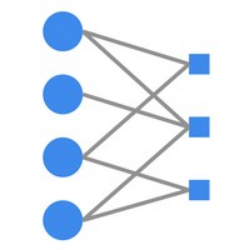Motivation: Driver (epi)genomic alterations underlie the positive selection of cancer subpopulations, which promotes drug resistance and relapse. Even though substantial heterogeneity is witnessed in most cancer types, mutation accumulation patterns can be regularly found and can be exploited to reconstruct predictive models of cancer evolution. Yet, available methods cannot infer logical formulas connecting events to represent alternative evolutionary routes or convergent evolution. Results: We introduce PMCE, an expressive framework that leverages mutational profiles from cross-sectional sequencing data to infer probabilistic graphical models of cancer evolution including arbitrary logical formulas, and which outperforms the state-of-the-art in terms of accuracy and robustness to noise, on simulations. The application of PMCE to 7866 samples from the TCGA database allows us to identify a highly significant correlation between the predicted evolutionary paths and the overall survival in 7 tumor types, proving that our approach can effectively stratify cancer patients in reliable risk groups. Availability: PMCE is freely available at https://github.com/BIMIB-DISCo/PMCE, in addition to the code to replicate all the analyses presented in the manuscript. Contacts: daniele.ramazzotti@unimib.it, alex.graudenzi@ibfm.cnr.it.
翻译:动机:驱动器(epi)基因组变化是积极选择癌症亚群人口的基础,有助于药物抗药性和复发。尽管在大多数癌症类型中都看到大量异质性,但可以经常发现突变积累模式,并可用于重建癌症演变的预测模型。然而,现有方法无法推断出将事件联系起来的逻辑公式,以代表其他进化途径或趋同演变。结果:我们引入了PMCE,这是一个表达式框架,它利用跨部门测序数据的突变剖面图谱来推断癌症演变的概率性图形模型,包括任意的逻辑公式,在模拟中超越了对噪音的准确性和稳健度。将PMCE应用于TCGA数据库的7866个样本使我们能够确定预测进化路径与7种肿瘤总体存活之间的非常重要的关联,证明我们的方法能够有效地在可靠的风险群体中遏制癌症患者。可用:PMCE可自由在https://github.com/BISMIB/PMCE/PMCE/PMCE@hestimex@regaltraphal:C.



